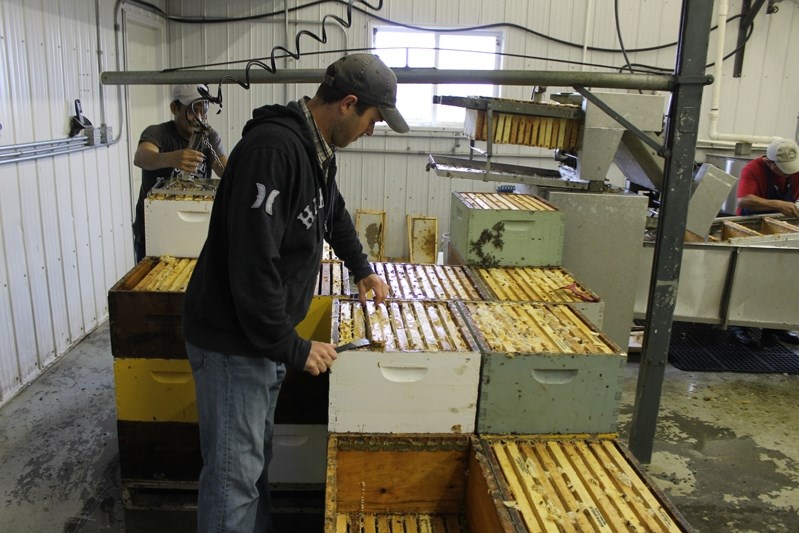Perched atop a hill east of Innisfail Nixon Farms stands tall amongst honey producers supplying retailers in Alberta and Saskatchewan with a quality unpasteurized product.
Since 1999, the Nixon family has been one of the top producers among more than 180 commercial beekeepers in Alberta, and their market keeps growing.
“We first got into beekeeping when my sister married into a family by Stettler that had a bee operation,” said Kevin Nixon, co-owner of Nixon Honey, along with brother Craig and father Bryan. “We used to go out and help on the weekends, and realized the potential of the business. It wasn't too long and Nixon Honey was born.”
Kevin, Craig and Bryan started the business and now provide honey to customers from as far away as Japan, and to packagers in North America. They also package their own product for nearly 70 retail customers and farmers markets around Alberta, and provide pollination services to hybrid canola farmers upon request.
“It is very important to keep a steady income flow to the company,” said Nixon. “When the honey market is good, we try to have more bees in the fields than pollinizing, and when the farmers markets are slow, we put more bees in fields in southern Alberta.”
He noted that when they first started he never expected it would grow to where they are now, with 18 workers and a provincial network of customers.
“We have more than 200 hives on as many as 50 locations within a one-hour drive from here,” said Nixon. “Every day during bee season, we collect between 1,000 and 1,500 boxes and take them to processing. Each box holds nine frames and over a year, each hive produces more than six boxes of honey, depending on the year.”
The beekeeper explained that the boxes are kept in a warm, humid room for between two and three days for the honey to loosen up, then the boxes are moved to extraction where the frames are cleaned, spun clean of honey, and put back into the boxes. The extracted honey then goes to a first separator, and then a second separator to finally get the honey ready. Flavouring is added if required, and the product is packaged for shipment to retail or wholesale customers.
“We don't waste product,” said Nixon. “Even the wax that is on the frames is shaved off, and we send that to makeup companies who use it in makeup.”
Nixon added that beekeeping is hard work and that his staff is used to working in hot and sweaty conditions, and are also not afraid or allergic to bee stings.
“It took me two years to become accustomed to being stung and I carried an EpiPen for a while,” said the young beekeeper. “Now I barely notice or even feel the stings, unless they get me on the face.”
Nixon added that being a commercial beekeeper is similar to farming, except that his input costs are not a big combine or swather, but rather in stainless steel equipment involved in production and trucks for shipping and picking up bee boxes.
“We do find that skunks are our most common natural enemy, as they do scratch the front of the hives and try to eat the bees,” added Nixon. “We have to control their populations. As our bee season is early spring to late October, weather also can affect our production.”
He noted that all of their boxes will be in cold storage soon and their hives will be insulated and the bees prepared for winter dormancy.
“We have had good years and bad years,” said Nixon, who also serves as vice-president of the Canadian Honey Council. “A few years back, Ontario had problems with pesticide causing a loss in bee populations, but it seems to be under control now with more seed coating pesticides being used on canola. This year has been good.”
Nixon Farms produces more than 750,000 pounds of honey annually, which goes around the world.
“Canadian honey, and particularly Alberta honey is seen as premium product and is often blended with Chinese and Argentinian honey by packagers,” said Nixon. “We take pride in providing pure 100 per cent Alberta honey to our customers. It is important to read the label on the honey at your table. If it doesn't say Nixon, it's not 100 per cent Albertan.”
The young beekeeper is still passionate about bees, even after 15 years.
“It really is amazing what the little insect can do, and how much they impact the world,” said Nixon. “They really do help feed the world.”
For more information on Nixon Honey go to nixonhoney.ca or call 403-227-2719.



